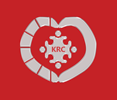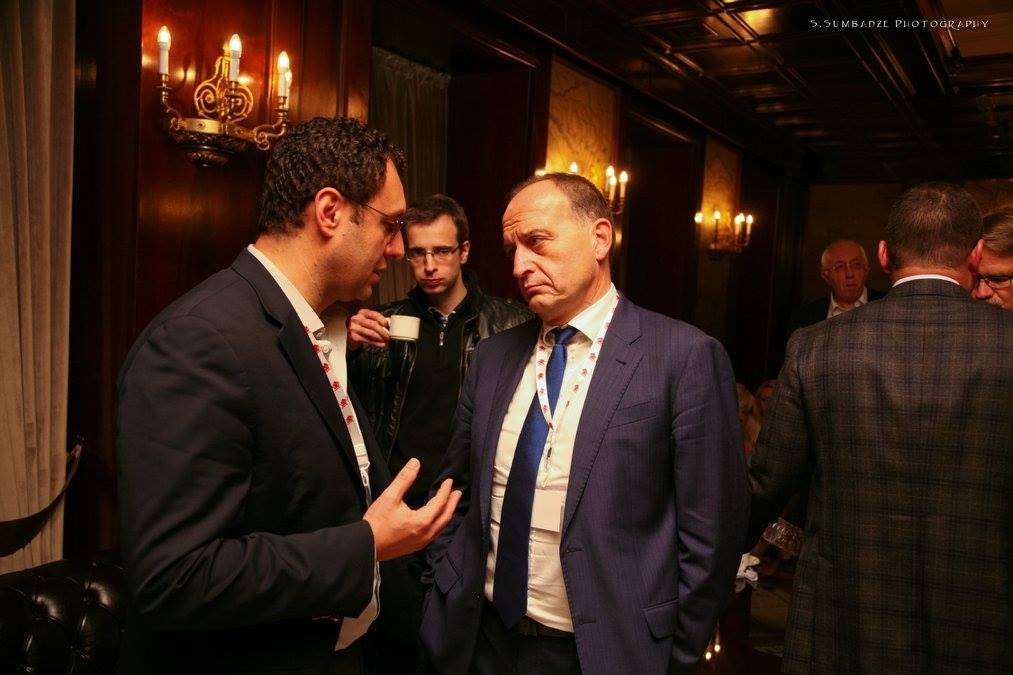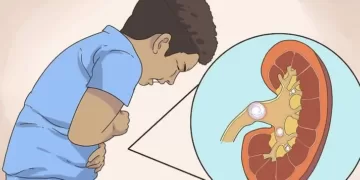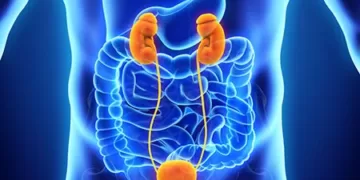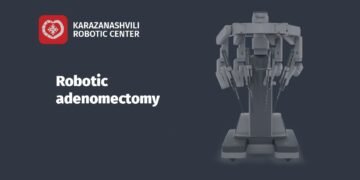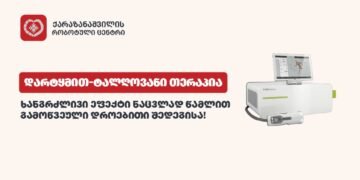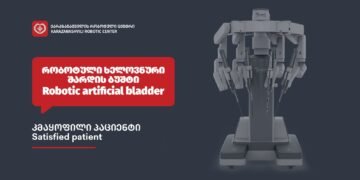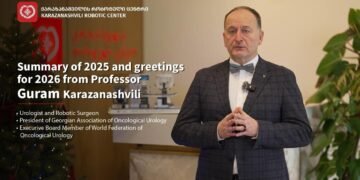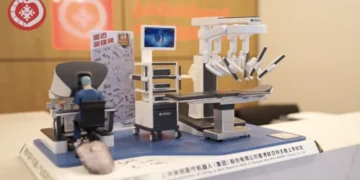How an Artificial Bladder—Orthotopic Urinary Diversion—is Created
“When a country has great professionals, its people spread their wings, overcome every problem with ease, and strive more visibly toward excellence. Now imagine a country of professionals!”
I really like this quote by Nikolay Chernyshevsky, and it always comes to mind when I meet with Professor Guram Karazanashvili—not only because he is an exceptional professional and a remarkable person, but also because thanks to him, many people have truly spread the wings of joy after overcoming extremely serious health problems.
A cancer diagnosis is practically a death sentence for a patient, as well as for their family and loved ones. Now imagine being diagnosed with bladder cancer—one of the most insidious and fast-progressing cancers. If we also consider that surgical treatment for bladder cancer is one of the most complex operations in oncological surgery (performed by only 9% of American urologists), and that Georgian patients do not need to travel abroad for this operation because it is successfully performed by Professor Guram Karazanashvili, you will understand just how much this truly is the spreading of wings for those in dire need.
What’s even more important is that after the operation, patients do not experience any discomfort. They urinate normally and physiologically through the urethra (the natural urinary tract), but now from an artificial bladder—a reservoir created from their own intestinal tissue.
While it’s easy to describe this in words, in reality it is an extremely complex surgical procedure, achieved through tremendous effort and expertise, as you’ll learn more about below.
But first, a few words about one of our country’s greatest professionals—a distinguished doctor and remarkable individual—Professor Guram Karazanashvili:
He is a clinical professor at Tbilisi State Medical University and a leading specialist in urology at Karazanashvili Robotic Center. At the same time, he serves as the Georgian representative of the American Urological Association, a full member of the European Association of Urology, an associate member of the Oncological Urology Section Board of the same association, and a member of the Executive Board of the Georgian Urological Association. He is also affiliated with the International Section of the American Urological Association and the Clinical Research Office of the European Association of Urology. He has been awarded numerous scholarships and honors, and is a member of the Supervisory Board of the German Alumni Association.
He has received the National Award of Georgia for his achievements in prostate cancer research and was honored with a Best Presentation Prize for his lecture titled “Progress and Controversies in Oncological Urology” (Rotterdam, Netherlands).
According to the Certification Committee of the Ministry of Health of Georgia, he has been designated a urologist of the highest category.
He has completed clinical and scientific training at:
- The Urology Department of Vivantes Hospital (Berlin, Germany)
- The Urology Department of Bonn University Hospital (Bonn, Germany)
- Mayo Clinic, Duke University, University of Chicago, and Vanderbilt University through the academic exchange programs of the European and American Urological Associations (USA)
- Lund University and the Urology Department of Malmö University Hospital (Malmö, Sweden)
- The Urology Department of Vienna University Hospital (Vienna, Austria)
- The Urology Department of Offenbach am Main City Hospital (Offenbach am Main, Germany)
- The Urology Department of Radboud University Medical Center (Nijmegen, Netherlands)
Here is what Professor Stefan Müller, Director of the Urology Clinic at Bonn University Hospital and former President of the German Urological Society, writes about our Georgian doctor:
“Seventeen years ago, Professor Karazanashvili came to my department as a young urologist through a German exchange program grant. He impressed all my colleagues with his knowledge and passion for his work. He had studied in Moscow and never missed an opportunity to travel the world and work in countries like Sweden, Norway, Austria, and the USA. So, by the time he came to work with us, he already had extensive experience as a urologist.
In Germany, he not only proved that he was a brilliant urologist, but we also developed a very strong friendship, thanks to which I have visited Georgia many times. Professor Karazanashvili is known worldwide for his knowledge, experience, and scientific achievements. Based on all of this, he has greatly advanced and developed the field of urology in Georgia. I’m happy to have such an outstanding and close friend in Georgia.”
And we are proud to have such an exceptional surgeon in Georgia!
Guram Karazanashvili is outstanding not only for his professionalism but also for his personal qualities. He deserves praise for his integrity, deep inner culture, responsibility, warmth, and compassion toward his patients, as well as his respectful attitude toward colleagues—something, unfortunately, rare in our reality.
He heals not only with the skilled hands of a master surgeon but, above all, with a warm and caring approach, like a true healer. All his patients can attest to that. Here are a few of their comments:
Shakro G., 65 years old, from Abasha:
“I have nothing but gratitude for Guram Karazanashvili and Giorgi Kalandia. They are amazing doctors and human beings. I’ve never met people like them. The entire team is wonderful—they look into your eyes, eager to see you well and back on your feet. Where else does that happen today? And they even talk kindly to the patients! Thanks to Guram, I’m healthy today. In December 2010, he created a reservoir from my own intestine. Since then, I’ve felt like a completely normal person—I eat, drink, and do everything I want. Guram is a phenomenal doctor and a remarkable man. I can only say thank you!”
L.R., 57 years old, from Zugdidi:
“Thank you so much to Guram—he’s a wonderful person. He operated on me four months ago. He welcomed me so warmly and was delighted to hear that I, too, graduated from Komarov School. He kept saying with a smile, ‘We’re schoolmates.’
He treats all his patients with such care, and all the doctors in his clinic are equally warm and attentive. I was up on my feet just 15 days after surgery.
The most amazing part was that after I was discharged, they actually called me to ask how I was doing and whether I had any problems. Have you ever heard of a doctor calling their patient to check in? I can only say thank you—they saved me from cancer. And yes, I even allowed myself a beer or two—and everything’s fine!”
Fridoni G., 54 years old, from Tsalenjikha:
“I had my surgery in September 2012. The bladder tumor had grown to 4.5 cm, even though I had already been seen at another clinic where they told me I would definitely need a bladder removal.
Guram performed the operation for ten hours. Of course, I don’t remember it, but afterward I spent five days in intensive care. The staff was very attentive—Guram and his assistants visited me every day. Now I’m doing great. Even after undergoing six rounds of chemotherapy, based on Guram’s advice, I feel completely normal—and yes, I drink wine too. You know how it is with Georgian men—what kind of life is it without wine?
Guram encouraged me after the surgery, saying, ‘You won’t have any problem drinking—we built you two bladder-sized reservoirs!’ I’m extremely satisfied with this man. It really matters how a doctor treats you, and he’s truly wonderful. He feels your pain, stays by your side—his face shows exactly how warmhearted he is.”
– Professor Guram, could you please explain to our readers when the creation of an artificial urinary bladder becomes necessary?
– The need for complete surgical removal of the urinary bladder (radical cystectomy) and, consequently, for a reconstructive operation (creation of an artificial reservoir) arises in cases of malignant tumors in the pelvic cavity. This is most commonly due to bladder cancer itself, but can also result from advanced cancers of the prostate, cervix, uterus, and vagina—when these tumors invade the bladder. In all such pathologies, for both men and women, removal of the bladder may become necessary along with adjacent organs.
In men, this usually involves removal of the bladder along with the prostate (cystoprostatectomy) and seminal vesicles. In women, it often involves the uterus and its appendages, and in some cases, the proximal part of the vagina as well.
Sometimes, even in benign tumors where the bladder capacity has been reduced, we may preserve part of the patient’s original bladder and increase its volume using a segment of the small intestine. This is called intestinal augmentation.
In general, the extent of the surgical procedure and the method of urinary diversion are determined by the spread of the disease, the patient’s age, and overall health condition. For example, in cases of advanced cancer where it’s not possible to preserve the sphincter, an ileal conduit (also known as a urostomy) is performed.
This operation involves diverting the urine directly outside the body, bypassing the urethra. A segment of the intestinal wall is used to form an artificial channel that continues from both ureters and opens through the skin on the abdominal wall via a single stoma. Urine flows from this point into a special externally attached urine collection bag. While this surgery is effective, the presence of a stoma causes discomfort for the patient, as it requires constant monitoring (emptying the urine bag) and careful skin hygiene. However, compared to other urinary diversion methods, it carries a lower risk of postoperative complications.
There is also a method of urinary diversion that involves creating a sigmoid-rectal reservoir (in effect, a cloaca, as both urine and stool mix in the same chamber). In this procedure, a longitudinal incision is made between the sigmoid and rectum, which is then sutured transversely. This disrupts the synergy of that part of the intestine, preventing it from contracting and thus eliminating the risk of reflux.
For a surgeon working in urology, it is essential to master all methods of urinary diversion to determine the most optimal solution for each patient based on their individual condition. Although orthotopic urinary diversion is the method that most closely mimics natural physiology and is generally the most desirable option for patients with pelvic malignancies, it is not always feasible to perform.
– More specifically, what does orthotopic urinary diversion mean?
– The creation of an artificial reservoir is the imitation of a urinary bladder using parts of the large and small intestines. The essence of the operation is that a reservoir for urine is constructed from intestinal tissue. The ureters are implanted into this reservoir, which is then connected to the urethra. After the surgery, urine exits the body through the urethra — the natural pathway. Although the operation is complex, it does not result in any cosmetic defects and appears completely natural.
Particularly important is the issue of urinary continence after surgery. This procedure is performed using a nerve-sparing technique. According to the statistics of our clinic, the rate of urinary incontinence is only 2–3%. The patient must empty the reservoir frequently (every 2–3 hours); the new bladder is emptied by contracting the abdominal wall muscles and applying manual pressure to the area above the pubic bone. Overfilling the reservoir must be strictly avoided.
As we learned from Professor Guram, orthotopic urinary diversion (i.e., placing the new bladder in the same anatomical location) is essentially the result of two decades of development — even though the concept of creating an intestinal reservoir has a long history (used even 100 years ago). While many clinics may still perform such reconstructions today, they often do so without connecting the reservoir to the urethra.
In Georgia, this highly complex surgery is performed exclusively by Professor Karazanashvili. Why wasn’t it done before?
- Karazanashvili:
– The reason is that, previously, we didn’t know how to preserve the natural sphincter — the muscular structure that controls urinary continence — in either men or women. This was a general limitation among surgeons worldwide. Thus, connecting a newly created reservoir to the urethra was pointless, as the patient would not be able to retain urine without a functioning sphincter and would have to rely on diapers constantly.
The ability to preserve the natural sphincter during surgery — known as the nerve-sparing technique — was developed thanks to the widespread practice of radical prostatectomies. When the prostate is removed, preserving the sphincter always becomes a critical issue. One of the most common complications after prostatectomies is urinary incontinence. In our clinic, this complication rate has been reduced to zero, while in many other clinics it reaches 10–12%.
– So, does it mean that if a surgeon is not proficient in the technique of radical prostatectomy, they also cannot perform orthotopic urinary diversion?
– That is absolutely correct. In fact, to perform this highly complex surgery, a surgeon must also have full command of working with intestines within the abdominal cavity, including various techniques and combinations. This requires specialized knowledge, education, and experience, as it is an extremely difficult and multi-hour procedure. Performing it on a daily basis is simply unimaginable. On average, it takes 7–8 hours, but it can last up to 10–12 hours.
Let me remind you that, according to U.S. statistics, only 9% of urologists perform this surgery. In leading clinics around the world, if more than 20 such operations are carried out per year, it is considered a high number.
– How does your clinic compare in this regard?
– In our clinic, around 30 such surgeries are performed annually. As I mentioned, this procedure cannot be done every day because it requires immense resources. Due to the complexity and length of the operation, patients require intensive postoperative care.
The patient must remain completely without food in the intensive care unit for 5–6 days. During this time, they need numerous infusions (nutritional support, protein, vitamin supplements), medications, three strong antibiotics, continuous monitoring of many parameters, and corresponding examinations. The reservoir is flushed every three hours, around the clock, for 24 hours, because mucus accumulates in it until the surgical wounds heal.
So, there are numerous technical nuances and aspects to monitor not only during the operation but throughout the postoperative period as well. This demands a cohesive, well-organized, and highly professional medical team.
– What complications are associated with orthotopic urinary diversion?
– Unfortunately, this operation can result in many complications, which are not solely dependent on the surgeon’s skill. Problems can arise at the urethral connection site, where the ureters are implanted, due to leakage at the reservoir suture line, intestinal anastomosis failure, wound infections, and more.
According to the latest European and American guidelines, potential complications are categorized into five grades and, overall, occur in 30–64% of cases. Mortality rates reach 1.3–2% within 30 days and up to 8% within 90 days after surgery.
That is precisely why this operation is considered one of the most complex procedures not only in onco-urology but in the entire field of surgery.
– That’s a very alarming statistic…
– I agree with you. At first glance, based on these numbers, one might think this surgery shouldn’t be performed at all. But if we don’t, it means a person with bladder cancer will die. Bladder cancer is a terribly insidious, aggressive, rapidly progressing, and metastasizing disease. Statistics show that even a one-month delay in surgery significantly worsens the prognosis.
This is a cancer that kills in agony — the patient is in the bathroom every five minutes, urinates blood, suffers from intense pain, urinary retention, bleeding, and blockages. Anyone who has seen a terminal-stage bladder cancer patient would agree that despite the potential complications, surgery is the only salvation.
The only salvation — and perhaps a chance to spread one’s wings again, because when everything goes well, patients (essentially cured of cancer) urinate naturally, eat, drink, and — as many survivors say — live life however they want!
Fortunately, we have this “wing-giving” surgeon right here in Georgia!
For his selfless service to the congregation of the Georgian Church and to others in need, the distinguished physician Guram Karazanashvili was publicly thanked on May 18, 2014 by the Catholicos-Patriarch of All Georgia.
So you decide for yourself just how important and pride-worthy it is when a country has such great professionals!
Tinatin Gotsadze
Source: mkurnali.ge
“Karazanashvili Robotic Center” offers treatment of urogynecological pathologies using methods aligned with global medical standards.
